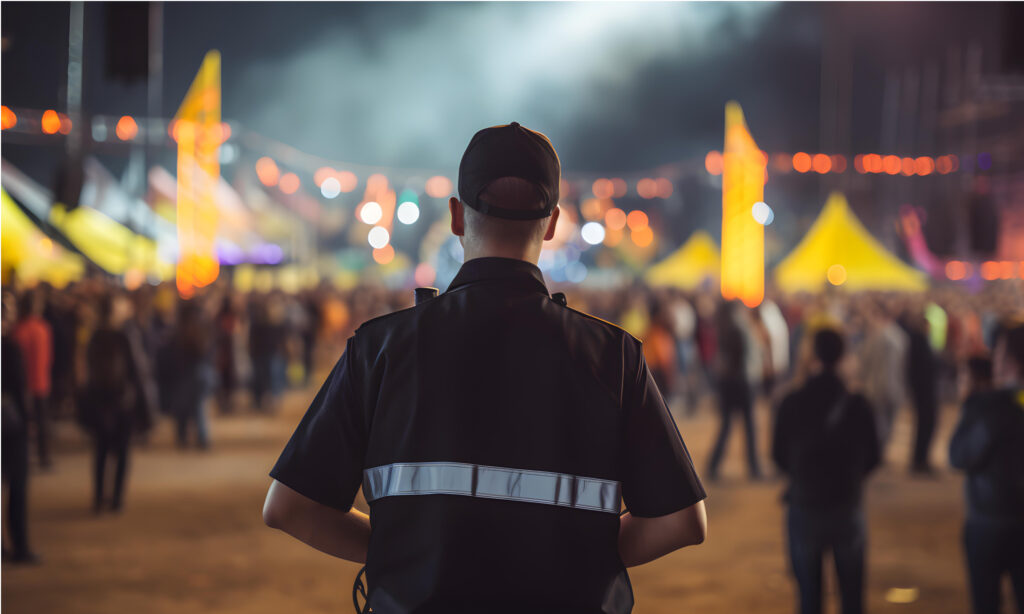Ensuring safety at large-scale events has always been a priority, but with today’s evolving security threats, how can event organisers create a safe yet enjoyable environment? The answer lies in event security technology.
These advanced tools not only mitigate risks but also enhance the overall experience for attendees. The growing complexity of modern events demands innovative solutions, and leveraging event security technology is the key to achieving that goal.
The Pain Point: The risk of security breaches, uncontrolled crowds, and emergencies looms large over any event. These challenges can lead to anxiety, budget strain, and potential bad press.
Thankfully, integrating event security technology offers a proactive solution to these concerns, ensuring that organisers can manage risks effectively while enhancing safety.
Leveraging Technology for Enhanced Event Security
1. Access Control and Identification:
- Facial Recognition: Imagine attendees entering an event with just a glance. Facial recognition is revolutionising access control by enabling swift, accurate identification. This event security technology reduces queues and boosts security by ensuring only authorised individuals are allowed in.
- RFID Wristbands and Mobile Ticketing: RFID wristbands and mobile tickets eliminate paper passes, streamlining entry and exit points. This technology provides real-time tracking of attendees and supports cashless payments, making the event smoother for both organisers and guests.
- Biometric Authentication: Adding an extra layer of security, biometric systems like fingerprint and iris recognition further control access to sensitive areas. This advanced event security technology ensures that only permitted individuals can enter certain zones, boosting overall safety.
2. Crowd Management and Monitoring
Real-time Data Analytics
Advanced data analytics can monitor crowd movements, highlight congestion points, and suggest proactive adjustments. This event security technology helps organisers maintain a steady flow of attendees, reducing the chance of overcrowding or chaos.
Crowd Monitoring Systems
Using cameras and sensors, organisers can monitor the venue for crowd density. Event security personnel receive real-time alerts if any area becomes overly crowded, allowing for quick interventions to ensure guest safety.
AI-powered Surveillance
Artificial intelligence enhances surveillance by analysing footage and identifying suspicious behaviour. AI technology can send alerts to security teams, enabling them to respond immediately to potential security threats.
3. Incident Response and Communication:
- Emergency Communication Systems: Mobile apps and SMS alerts allow organisers to provide updates and instructions to attendees during emergencies. Fast, clear communication is critical for ensuring safety and guiding people out of harm’s way during an event.
- Panic Buttons and Security Alarms: Panic buttons and alarms connected to local authorities or event staff allow for swift responses to incidents. This event security technology ensures that help is just a button press away, ensuring timely intervention.
- Real-time Data Sharing: Security teams across an event can stay connected through shared communication platforms. Event security technology enables quick coordination, ensuring faster and more efficient responses to any potential threats.
4. Security Personnel Training and Equipment:
Virtual Reality Training
VR simulators offer security teams hands-on training by simulating real-life event scenarios. Security staff can practice responding to threats, ensuring they are well-prepared for the actual event.
Body Cameras
Body cameras worn by security personnel provide a visual record of events, helping with post-event investigations and improving accountability.
Advanced Security Equipment
From metal detectors to walk-through scanners and security drones, investing in advanced equipment boosts event security. These tools act as both a deterrent and a solution, enhancing overall safety.
5. Post-Event Analysis and Improvement:
- Data-driven Insights: After the event, analysing data gathered during the event is crucial. This analysis helps identify areas where security could be improved and ensures future events are safer.
- Feedback Collection: Collecting feedback from attendees and staff allows organisers to gain insights into security concerns and areas for improvement. This proactive approach strengthens future security strategies.
Best Practices for Implementing Technology in Event Security
- Planning and Design: Security technology should be integrated from the start, ensuring it aligns with the event’s specific needs and budget.
- Integration and Compatibility: Ensure your chosen event security technology works seamlessly with existing systems. This avoids potential disruptions on the day of the event.
- Data Privacy and Security: Always prioritise data privacy and protection. Adhere to regulations and best practices to safeguard attendee information.
- Training and Support: Provide comprehensive training for staff on the event security technology in use, ensuring smooth operation during the event.
- Continuous Evaluation and Improvement: Regularly evaluate the effectiveness of security measures and make improvements where necessary to stay ahead of potential risks.
Conclusion
By leveraging cutting-edge event security technology, you can create a safer, more enjoyable environment for attendees. Whether it’s advanced access control, real-time monitoring, or seamless incident response, these tools are vital in ensuring the success of your event.
For professional security solutions tailored to your event, contact Accord Security to explore how our expertise can help secure your next special occasion.
Investing in event security technology is an investment in peace of mind, allowing everyone to focus on enjoying the event without worrying about safety.
Frequently Asked Question
Costs vary depending on the type of technology, event size, and complexity. Tailor your budget to meet your specific security needs.
No, even smaller events can benefit from technology like RFID wristbands or mobile ticketing apps for efficient access control.
Select technologies that comply with data privacy regulations and implement encryption and access controls to protect personal information.
Potential risks include data breaches and system failures. It’s important to use reliable providers and implement backup plans.
Yes, existing infrastructure can often be leveraged, though additional measures may be necessary based on the event’s size and complexity.
